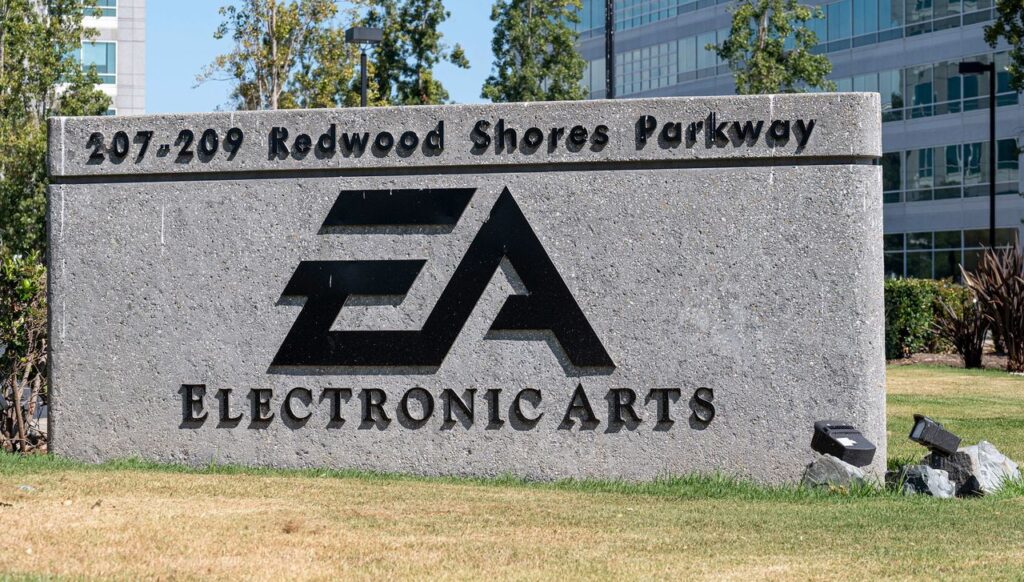As reported by the The Wall Street Journal, gaming giant EA is set to go private—that is, no longer be traded on the stock market—in a $50 billion deal with an investor group. This would be the largest such leveraged buyout ever recorded.
According to the WSJ’s anonymous sources, EA could be sold for as much as $50 billion, though the final price has not yet been agreed on, and EA has an estimated market value of $43 billion. The group of investors reportedly includes the private equity firm Silver Lake and the government of Saudi Arabia’s Public Investment Fund.
The deal could be announced as early as next week, and would be the largest leveraged buyout ever recorded. A leveraged buyout is when a private equity firm uses a significant amount of borrowed money to seal the deal, with the asset set to be acquired used as collateral in the debt.
This effectively leaves the acquired company liable for the debt—if its income can’t adequately service the debt, it will bear the consequences of a default, not the investors who made the purchase, and that usually means closures and layoffs. As reported by the Los Angeles Times, one such leveraged buyout eventually resulted in bankruptcy and closure for the once-ubiquitous toy retailer, Toys R Us.
The fact that the upper bound cited for the deal is proportionally close to EA’s estimated value (what’s $7 billion between friends?) could give reason for optimism that EA’s debt burden would be proportional to its means. Even aside from eventual bankruptcy, though, there’s precedent for acquisitions like this causing massive disruptions to the company: Microsoft cut 1,900 jobs at Xbox in January 2024 shortly after its acquisition of Activision-Blizzard, and Blizzard Entertainment was heavily affected in particular.
The other known quantity in the purported deal, the Saudi Arabian Public Investment Fund, has been making inroads in games for several years as part of a multifaceted push into global media and entertainment. This has included:
- Sports: Saudi Pro League Football, LIV Golf, the Professional Fighters League.
- Entertainment: Investment in Hollywood films. Ownership stakes in gaming companies like Nintendo and Capcom, including a 10% stake in EA prior to this deal.
- Sports Entertainment: Saudi Arabia made a $1 billion deal in 2018 to host major WWE events in the kingdom, and the promotion recently announced that Wrestlemania 43 will be held in Riyadh in 2027.
Critics of the Saudi Arabian government have called this practice “sportswashing,” or using a growing influence and ubiquity in the entertainment industries to distract from the government’s human rights record.
EA, much like its competitor Ubisoft, has struggled in recent years. Once formidable titans, both have been left behind as consolidation efforts have turned Microsoft and Sony into unassailable super heavyweights. At the same time, smaller publishers like DreadXP, Devolver, and Playstack have become ubiquitous at the other end of the budget spectrum.
EA lost the lucrative FIFA license, leading to its new, genericized EA FC series. Beloved RPG developer BioWare was sharply downsized after Dragon Age: The Veilguard proved a relative sales failure. The impending release of Battlefield 6, which has seen massive beta numbers and a positive critical reception, is looking like a much-needed win for the company.
Should the deal go through, here are some of the major studios and games that could be affected:
- BioWare: Mass Effect and Dragon Age.
- Respawn: Titanfall, Apex Legends, the Star Wars: Jedi series.
- DICE (and the other ‘Battlefield Studios’): Battlefield and Mirror’s Edge
- Maxis: The Sims 4 and Project Rene.
- The Madden NFL and EA Sports College Football series (and other EA Sports games).
- The dormant Dead Space and Need for Speed series.
- The once-dormant Skate, recently resurrected.
- The Command & Conquer series.
- The Origin Systems back catalogue, including Ultima and Wing Commander. Pepperidge Farm remembers.




This is a significant development in the gaming industry! A $50 billion buyout is quite a milestone, and it will be interesting to see how this impacts EA’s future projects and direction. Exciting times ahead for gamers and investors alike!
Absolutely, it really highlights the growing interest in gaming as a lucrative market. It’ll be interesting to see how this transition to private ownership affects EA’s future game releases and overall strategy.
It’s definitely an exciting time for the gaming industry! The shift to private ownership could also mean more creative freedom for EA to explore innovative projects without the pressure of public shareholders. It’ll be interesting to see how this impacts their game development strategy moving forward.
lead to new opportunities for innovation and creativity without the pressures of public investors. It will be interesting to see how this change affects EA’s game development strategies moving forward!
That’s a great point! Going private could indeed allow EA to take bigger risks and explore new game concepts without the constant scrutiny of shareholders. It’ll be interesting to see how this change impacts their game development strategy in the long run.
Absolutely! Going private might also enable EA to focus more on long-term projects without the pressure of quarterly earnings. This could lead to more innovative gameplay experiences that fans have been craving.
That’s a great point! Going private could indeed allow EA to invest in innovative game development without the constant scrutiny of public shareholders. It may also give them the freedom to take creative risks that could lead to exciting new franchises.
Absolutely, going private might give EA the freedom to explore more creative projects without the pressures of public scrutiny. It’ll be interesting to see how this affects their studio collaborations and game diversity in the long run!
That’s a great point! Going private could indeed allow EA to take more risks with innovative game concepts. It might also foster a more focused approach to player feedback and community engagement, which could enhance their offerings even further.
Absolutely! Going private might also enable EA to focus more on long-term projects without the pressure of quarterly earnings reports. This could lead to more creative freedom and potentially groundbreaking titles. It’ll be interesting to see how this shift impacts their game development strategy!
That’s a great point! Going private could indeed allow EA to invest in innovative game development without the pressure of quarterly earnings reports. It might also foster a more creative environment for their teams to take risks on new ideas.
Absolutely, going private might also give EA more flexibility to take risks on new projects without the pressure of quarterly earnings reports. This could lead to more creative and experimental games that might not fit the traditional mold. It’ll be interesting to see how this shift impacts their overall strategy!